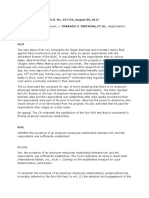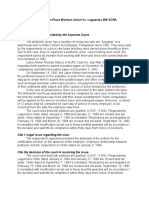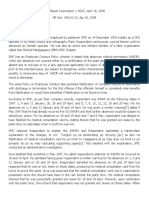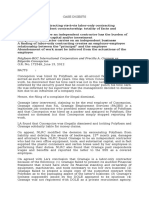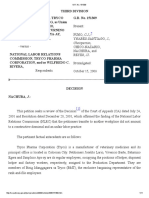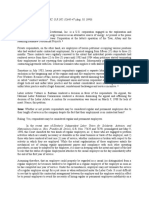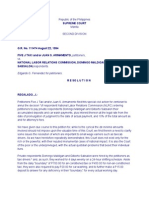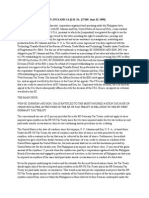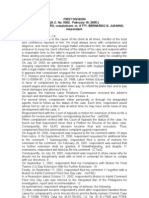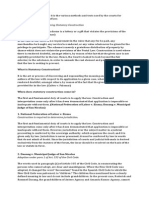100%(1)100% found this document useful (1 vote)
755 viewsCase Digest
This document summarizes a labor case involving Antonio Bautista, a bus driver employed by Auto Bus Transport Systems, who was terminated and sued the company for illegal dismissal. The main issues were whether Bautista was entitled to service incentive leave pay, and if the three-year prescriptive period to claim such pay applied. The Supreme Court ultimately ruled that Bautista was entitled to the leave pay, as he was not considered a field employee given he had a set route and was supervised. It also found the prescriptive period did not apply as he filed his claim within one month of dismissal.
Uploaded by
Marvin MagaipoCopyright
© © All Rights Reserved
Available Formats
Download as DOCX, PDF, TXT or read online on Scribd
100%(1)100% found this document useful (1 vote)
755 viewsCase Digest
This document summarizes a labor case involving Antonio Bautista, a bus driver employed by Auto Bus Transport Systems, who was terminated and sued the company for illegal dismissal. The main issues were whether Bautista was entitled to service incentive leave pay, and if the three-year prescriptive period to claim such pay applied. The Supreme Court ultimately ruled that Bautista was entitled to the leave pay, as he was not considered a field employee given he had a set route and was supervised. It also found the prescriptive period did not apply as he filed his claim within one month of dismissal.
Uploaded by
Marvin MagaipoCopyright
© © All Rights Reserved
Available Formats
Download as DOCX, PDF, TXT or read online on Scribd
You are on page 1/ 13
Auto Bus Transport Systems vs Bautista
On September 14, 2010
16 May 2005 l Labor Standards
Service Incentive Leave Pay
Antonio Bautista was employed by Auto Bus Transport Systems, Inc. in May 1995. He was assigned to the
Isabela-Manila route and he was paid by commission (7% of gross income per travel for twice a month).
In January 2000, while he was driving his bus he bumped another bus owned by Auto Bus. He claimed that he
bumped the he accidentally bumped the bus as he was so tired and that he has not slept for more than 24
hours because Auto Bus required him to return to Isabela immediately after arriving at Manila. Damages were
computed and 30% or P75,551.50 of it was being charged to Bautista. Bautista refused payment.
Auto Bus terminated Bautista after due hearing as part of Auto Bus management prerogative. Bautista sued
Auto Bus for Illegal Dismissal. The Labor Arbiter Monroe Tabingan dismissed Bautistas petition but ruled
that Bautista is entitled to P78,1117.87 13
th
month pay payments and P13,788.05 for his unpaid service
incentive leave pay.
The case was appealed before the National Labor Relations Commission. NLRC modified the LAs ruling. It
deleted the award for 13
th
Month pay. The court of Appeals affirmed the NLRC.
Auto Bus averred that Bautista is a commissioned employee and if that is not reason enough that Bautista is
also a field personnel hence he is not entitled to a service incentive leave. They invoke:
Art. 95. RIGHT TO SERVICE INCENTIVE LEAVE
(a) Every employee who has rendered at least one year of service shall be entitled to a yearly service
incentive leave of five days with pay.
Book III, Rule V: SERVICE INCENTIVE LEAVE
SECTION 1. Coverage. This rule shall apply to all employees except:
(d) Field personnel and other employees whose performance is unsupervised by the employer including
those who are engaged on task or contract basis, purely commission basis, or those who are paid in a fixed
amount for performing work irrespective of the time consumed in the performance thereof; . . .
ISSUE: Whether or not Bautista is entitled to Service Incentive Leave. If he is, Whether or not the three (3)-
year prescriptive period provided under Article 291 of the Labor Code, as amended, is applicable to
respondents claim of service incentive leave pay.
HELD: Yes, Bautista is entitled to Service Incentive Leave. The Supreme Court emphasized that it does not
mean that just because an employee is paid on commission basis he is already barred to receive service
incentive leave pay.
The question actually boils down to whether or not Bautista is a field employee.
According to Article 82 of the Labor Code, field personnel shall refer to non-agricultural employees who
regularly perform their duties away from the principal place of business or branch office of the employer and
whose actual hours of work in the field cannot be determined with reasonable certainty.
As a general rule, field personnel are those whose performance of their job/service is not supervised by the
employer or his representative, the workplace being away from the principal office and whose hours and
days of work cannot be determined with reasonable certainty; hence, they are paid specific amount for
rendering specific service or performing specific work. If required to be at specific places at specific times,
employees including drivers cannot be said to be field personnel despite the fact that they are performing work
away from the principal office of the employee.
Certainly, Bautista is not a field employee. He has a specific route to traverse as a bus driver and that is a
specific place that he needs to be at work. There are inspectors hired by Auto Bus to constantly check him.
There are inspectors in bus stops who inspects the passengers, the punched tickets, and the driver. Therefore
he is definitely supervised though he is away from the Auto Bus main office.
On the other hand, the 3 year prescriptive period ran but Bautista was able to file his suit in time before the
prescriptive period expired. It was only upon his filing of a complaint for illegal dismissal, one month from the
time of his dismissal, that Bautista demanded from his former employer commutation of his accumulated
leave credits. His cause of action to claim the payment of his accumulated service incentive leave thus accrued
from the time when his employer dismissed him and failed to pay his accumulated leave credits.
Therefore, the prescriptive period with respect to his claim for service incentive leave pay only commenced
from the time the employer failed to compensate his accumulated service incentive leave pay at the time of
his dismissal. Since Bautista had filed his money claim after only one month from the time of his dismissal,
necessarily, his money claim was filed within the prescriptive period provided for by Article 291 of the Labor
Code.
Definition of Service Incentive Leave
Service incentive leave is a right which accrues to every employee who has served within 12 months, whether
continuous or broken reckoned from the date the employee started working, including authorized absences
and paid regular holidays unless the working days in the establishment as a matter of practice or policy, or
that provided in the employment contracts, is less than 12 months, in which case said period shall be
considered as one year. It is also commutable to its money equivalent if not used or exhausted at the end of the
year. In other words, an employee who has served for one year is entitled to it. He may use it as leave days or he
may collect its monetary value.
University of Pangasinan Faculty Union vs. University of Pangasinan
G.R. No. L-63122 Feburuary 20, 1984
Facts:
The petitioners members are full time professors, instructors, and teachers of the respondent University. The teachers in the college level
teach for a normal duration of ten (10) months in a school year, divided into two (2) semesters of five months each, excluding the two-month
summer vacation. These teachers are paid their salaries on a regular monthly basis.
In November and December, 1981, the petitioners members were fully paid their regular monthly salaries. However, from November 7 to
December 5, during the semestral break, they were not paid their emergency cost of living allowance(ECOLA). The University claims that the
teachers are not entitled thereto because the semestral break is not an integral part of the school year and there being no actual services
rendered by the teachers during said period, the principle of No work, no pay appllies.
Issue:
Whether or not petitioner members are not entitled to ECOLA under No work, no pay principle.
Held:
The No work, no pay does not apply in the instant case. The petitioners members received their regular salaries during this period. It is
clear from the aforeqouted provision of the law that it contemplates a no work situation where the employees voluntarily absent
themselves. Petitioners, in the case at bar certainly do not, ad voluntatem, absent themselves during semestral breaks. Rather, they are
constrained to take mandatory leave from work. For this, they cannot be faulted nor can they be begrudged that which is due them under the
law. To a certain extent, the private respondent can specify dates when no classes would be held.. Surely, it was no the intention of the
framers of the law to allow employers to withhold employee benefits by simple expedient of unilaterally imposing no work days and
consequently avoiding compliance with the mandate of the law for these days.
Thus, the legal principles of No work, no pay; No pay, no ECOLA must necessarily give way to the purpose of the law to augment the
income of the employees to enable them to cope with the harsh living conditions brought about by inflation; and to protect employees and
their wages against the ravages brought by these conditions.
Jose Rizal College vs NLRC
On September 25, 2011
December 1, 1987
Labor Standards Working Conditions and Rest Periods Holiday Pay
The National Alliance of Teachers sued Jose Rizal College for alleged nonpayment of unworked holidays from
1975 to 1977. The members of the Alliance concerned are faculty members who are paid on the basis of
student contract hour.
ISSUE: Whether or not the school faculty are entitled to unworked holiday pay.
HELD: As far as unworked regular holidays are concerned, the teachers are not entitled to holiday pay.
Regular holidays specified as such by law are known to both school and faculty members as no class days;
certainly the latter do not expect payment for said unworked days, and this was clearly in their minds when
they entered into the teaching contracts.
On the other hand, the teachers are entitled to be paid for unworked special holidays. Otherwise stated, the
faculty member, although forced to take a rest, does not earn what he should earn on that day. Be it noted that
when a special public holiday is declared, the faculty member paid by the hour is deprived of expected
income, and it does not matter that the school calendar is extended in view of the days or hours lost, for their
income that could be earned from other sources is lost during the extended days. Similarly, when classes are
called off or shortened on account of typhoons, floods, rallies, and the like, these faculty members must
likewise be paid, whether or not extensions are ordered.
Philippine Duplicators Inc. vs. NLRC
GR 110068 February, 15, 1995
Ponente: Feliciano
FACTS:
(Note, the case was very procedurally technical, walang facts, nasa ratio na)
Case differentiates between Productivity Bonuses vs. Commissions
Productivity bonuses are generally tied to the productivity or profit generation of the employer
corporation. Productivity bonuses are not directly dependent on the extent an individual
employee exerts himself. A productivity bonus is something extra for which no specific
additional services are rendered by any particular employee and hence not legally demandable,
absent a contractual undertaking to pay it.
Sales commissions are intimately related to or directly proportional to the extent or energy of
an employee's endeavours. Commissions are paid upon the specific results achieved by a
salesman-employee. It is a percentage of the sales closed by a salesman and operates as an
integral part of such salesman's basic pay.
ISSUE:
1. WON The commissions received by the salesmen were part of the
wages to be considered for their 13
th
month pay. - Yes
2. WON Productivity bonus shall be considered as part of wages in 13
th
month pay - No
HELD:
1. The commissions were an integral part of the pay of the workers, considering that the
fixed wage was only 30% of what they were normally receiving.
2. Productivity bonuses are generally tied to the productivity, or capacity for revenue
production, of a corporation; such bonuses closely resemble profit-sharing payments
and have no clear director necessary relation to the amount of work actually done by
each individual employee. More generally, a bonus is an amount granted and paid ex
gratia to the employee; its payment constitutes an act of enlightened generosity and
self-interest on the part of the employer, rather than as a demandable or enforceable
obligation. Since productivity bonus is not demandable, then it cannot be considered
part of basic salary when time comes to compute 13
th
month pay.
Additional payments made to employees, to the extent they partake of the nature of
profit-sharing payments, are properly excluded from the ambit of the term "basic
salary" for purposes of computing the 13th month pay due to employees. Such
additional payments are not "commissions" within the meaning of the second
paragraph of Section 5 (a) of the Revised Guidelines Implementing 13th Month Pay.
The Supplementary Rules and Regulations Implementing P.D. No. 851 subsequently
issued by former Labor Minister Ople sought to clarify the scope of items excluded in
the computation of the 13th month pay; viz.:
Sec. 4. Overtime pay, earnings and other remunerations which are not part of
the basic salary shall not be included in the computation of the 13th month pay.
Boie-Takeda Chemicals, Inc. vs. de la Serna
228 SCRA 329, Dec. 10, 1993
Facts: P.D. No. 851 provides for the Thirteen-Month Pay Law. Under Sec. 1 of said law, all employers are required
to pay all their employees receiving basic salary of not more than P 1,000.00 a month, regardless of the nature of
the employment, and such should be paid on December 24 of every year. The Rules and Regulations
Implementing P.D. 851 contained provisions defining 13-month pay and basic salary and the employers
exempted from giving it and to whom it is made applicable. Supplementary Rules and Regulations Implementing
P.D. 851 were subsequently issued by Minister Ople which inter alia set items of compensation not included in the
computation of 13-month pay. (overtime pay, earnings and other remunerations which are not part of basic salary
shall not be included in the computation of 13-month pay). Pres. Corazon Aquino promulgated on August 13, 1985
M.O. No. 28, containing a single provision that modifies P.D. 851 by removing the salary ceiling of P 1,000.00 a
month. More than a year later, Revised Guidelines on the Implementation of the 13-month pay law was
promulgated by the then Labor Secretary Franklin Drilon, among other things, defined particularly what
remunerative items were and were not included in the concept of 13-month pay, and specifically dealt with
employees who are paid a fixed or guaranteed wage plus commission or commissions were included in the
computation of 13th month pay)
A routine inspection was conducted in the premises of petitioner. Finding that petitioner had not been
including the commissions earned by its medical representatives in the computation of their 1-month pay, a Notice
of Inspection Result was served on petitioner to effect restitution or correction of the underpayment of 13-month
pay for the years, 1986 to 1988 of Medical representatives. Petitioner wrote the Labor Department contesting the
Notice of Inspection Results, and expressing the view that the commission paid to its medical representatives are
not to be included in the computation of the 13-moth pay since the law and its implementing rules speak of
REGULAR or BASIC salary and therefore exclude all remunerations which are not part of the REGULAR salary.
Regional Dir. Luna Piezas issued an order for the payment of underpaid 13-month pay for the years 1986, 1987 and
1988. A motion for reconsideration was filed and the then Acting labor Secretary Dionisio de la Serna affirmed the
order with modification that the sales commission earned of medical representatives before August 13, 1989
(effectivity date of MO 28 and its implementing guidelines) shall be excluded in the computation of the 13-month
pay.
Similar routine inspection was conducted in the premises of Phil. Fuji Xerox where it was found there was
underpayment of 13th month pay since commissions were not included. In their almost identically-worded
petitioner, petitioners, through common counsel, attribute grave abuse of discretion to respondent labor officials
Hon. Dionisio dela Serna and Undersecretary Cresenciano B. Trajano.
ISSUE: Whether or not commissions are included in the computation of 13-month pay
HELD: NO. Contrary to respondents contention, M.O No. 28 did not repeal, supersede or abrogate P.D. 851. As
may be gleaned from the language of MO No. 28, it merely modified Section 1 of the decree by removing the P
1,000.00 salary ceiling. The concept of 13th Month pay as envisioned, defined and implemented under P.D. 851
remained unaltered, and while entitlement to said benefit was no longer limited to employees receiving a monthly
basic salary of not more than P 1,000.00 said benefit was, and still is, to be computed on the basic salary of the
employee-recipient as provided under P.D. 851. Thus, the interpretation given to the term basic salary was
defined in PD 851 applies equally to basic salary under M.O. No. 28. The term basic salary is to be understood
in its common, generally accepted meaning, i.e., as a rate of pay for a standard work period exclusive of such
additional payments as bonuses and overtime. In remunerative schemes consists of a fixed or guaranteed wage
plus commission, the fixed or guaranteed wage is patently the basic salary for this is what the employee receives
for a standard work period. Commissions are given for extra efforts exerted in consummating sales of other related
transactions. They are, as such, additional pay, which the SC has made clear do not from part of the basic salary.
Moreover, the Supreme Court said that, including commissions in the computation of the 13th month pay, the
second paragraph of Section 5(a) of the Revised Guidelines on the Implementation of the 13th Month Pay Law
unduly expanded the concept of "basic salary" as defined in P.D. 851. It is a fundamental rule that implementing
rules cannot add to or detract from the provisions of the law it is designed to implement. Administrative
regulations adopted under legislative authority by a particular department must be in harmony with the provisions
of the law they are intended to carry into effect. They cannot widen its scope. An administrative agency cannot
amend an act of Congress.
JPL MARKETING PROMOTIONS vs CA Case Digest
[G.R. No. 151966 July 8, 2005]
JPL MARKETING PROMOTIONS, Petitioner vs., COURT OF APPEALS, NATIONAL LABOR RELATIONS COMMISSION,
NOEL GONZALES, RAMON ABESA III and FAUSTINO ANINIPOT, Respondents.
FACTS
JPL Marketing and Promotions is a domestic corporation engaged in the business of recruitment and placement of workers.
On the other hand, private respondents Noel Gonzales, Ramon Abesa III and Faustino Aninipot were employed by JPL as
merchandisers on separate dates and assigned at different establishments in Naga City and Daet, Camarines Norte as
attendants to the display of California Marketing Corporation , one of petitioners clients.
On 13 August 1996, JPL notified private respondents that CMC would stop its direct merchandising activity in the Bicol
Region, Isabela, and Cagayan Valley effective 15 August 1996. they were advised to wait for further notice as they would be
transferred to other clients. However, on 17 October 1996, private respondents Abesa and Gonzales filed before the National
Labor Relations Commission Regional Arbitration Branch (NLRC) Sub V complaints for illegal dismissal, praying for separation
pay, 13th month pay, service incentive leave pay and payment for moral damages. Aninipot filed a similar case thereafter.
Executive Labor Arbiter Gelacio L. Rivera, Jr. dismissed the complaints for lack of merit. The Labor Arbiter found that
Gonzales and Abesa applied with and were employed by the store where they were originally assigned by JPL even before the
lapse of the six (6)-month period given by law to JPL to provide private respondents a new assignment. Thus, they may be
considered to have unilaterally severed their relation with JPL, and cannot charge JPL with illegal dismissal. The Labor Arbiter
held that it was incumbent upon private respondents to wait until they were reassigned by JPL, and if after six months they were
not reassigned, they can file an action for separation pay but not for illegal dismissal. The claims for 13th month pay and service
incentive leave pay was also denied since private respondents were paid way above the applicable minimum wage during their
employment.
NLRC. agreed with the Labor Arbiters finding that when private respondents filed their complaints, the six-month period had
not yet expired, and that CMCs decision to stop its operations in the areas was beyond the control of JPL, thus, they were not
illegally dismissed. However, it found that despite JPLs effort to look for clients to which private respondents may be reassigned
it was unable to do so, and hence they are entitled to separation pay.
The Court of Appeals dismissed the petition and affirmed in toto the NLRC resolution. While conceding that there was no
illegal dismissal, it justified the award of separation pay on the grounds of equity and social justice.
Issue
Whether or not the respondents are entitled to separation pay?
Held
Under Arts. 283 and 284 of the Labor Code, separation pay is authorized only in cases of dismissals due to any of
these reasons: (a) installation of labor saving devices; (b) redundancy; (c) retrenchment; (d) cessation of the employer's
business; and (e) when the employee is suffering from a disease and his continued employment is prohibited by law or is
prejudicial to his health and to the health of his co-employees.
However, separation pay shall be allowed as a measure of social justice in those cases where the employee is validly
dismissed for causes other than serious misconduct or those reflecting on his moral character, but only when he was illegally
dismissed.
In addition, Sec. 4(b), Rule I, Book VI of the Implementing Rules to Implement the Labor Code provides for the
payment of separation pay to an employee entitled to reinstatement but the establishment where he is to be reinstated has
closed or has ceased operations or his present position no longer exists at the time of reinstatement for reasons not attributable
to the employer.
The common denominator of the instances where payment of separation pay is warranted is that the employee was
dismissed by the employer. In the instant case, there was no dismissal to speak of. Private respondents were simply not
dismissed at all, whether legally or illegally. What they received from JPL was not a notice of termination of employment, but a
memo informing them of the termination of CMCs contract with JPL. More importantly, they were advised that they were to be
reassigned. At that time, there was no severance of employment to speak of.
Furthermore, Art. 286 of the Labor Code allows the bona fide suspension of the operation of a business or undertaking for a
period not exceeding six (6) months, wherein an employee/employees are placed on the so-called floating status. When that
floating status of an employee lasts for more than six months, he may be considered to have been illegally dismissed from the
service. Thus, he is entitled to the corresponding benefits for his separation, and this would apply to suspension either of the
entire business or of a specific component thereof.
As clearly borne out by the records of this case, private respondents sought employment from other establishments even
before the expiration of the six (6)-month period provided by law. As they admitted in their comment, all three of them applied for
and were employed by another establishment after they received the notice from JPL. JPL did not terminate their employment;
they themselves severed their relations with JPL. Thus, they are not entitled to separation pay.
Nonetheless, JPL cannot escape the payment of 13th month pay and service incentive leave pay to private respondents.
Said benefits are mandated by law and should be given to employees as a matter of right.
MAYON HOTEL & RESTAURANT vs. ROLANDO ADANA, et al.
G.R. No. 157634
May 16, 2005
FACTS:
Petitioner Mayon Hotel & Restaurant (MHR) hired herein 16 respondents as employees in its business in Legaspi City. Its
operation was suspended on March 31, 1997 due to the expiration and non-renewal of the lease contract for the space it rented.
While waiting for the completion of the construction of its new site, MHR continued its operation in another site with 9 of the 16
employees. When the new site constructed and MHR resumed its business operation, none of the 16 employees was recalled to
work.
MHR alleged business losses as the reason for not reinstating the respondents. On various dates, respondents filed complaints
for underpayment of wages, money claims and illegal dismissal.
ISSUES:
1. Whether or not respondents were illegally dismissed by petitioner;
2. Whether or not respondents are entitled to their money claims due to underpayment of wages, and nonpayment of holiday
pay, rest day premium, SILP, COLA, overtime pay, and night shift differential pay.
HELD:
1. Illegal Dismissal: claim for separation pay
Since April 1997 until the time the Labor Arbiter rendered its decision in July 2000, or more than three (3) years after the
supposed temporary lay-off, the employment of all the respondents with petitioner had ceased, notwithstanding that the new
premises had been completed and the same resumed its operation. This is clearly dismissal or the permanent severance or
complete separation of the worker from the service on the initiative of the employer regardless of the reasons therefor.
Article 286 of the Labor Code is clear there is termination of employment when an otherwise bona fide suspension of work
exceeds six (6) months. The cessation of employment for more than six months was patent and the employer has the burden of
proving that the termination was for a just or authorized cause.
While we recognize the right of the employer to terminate the services of an employee for a just or authorized cause, the
dismissal of employees must be made within the parameters of law and pursuant to the tenets of fair play. And in termination
disputes, the burden of proof is always on the employer to prove that the dismissal was for a just or authorized cause. Where
there is no showing of a clear, valid and legal cause for termination of employment, the law considers the case a matter of i llegal
dismissal.
If doubts exist between the evidence presented by the employer and the employee, the scales of justice must be tilted in favor of
the latter the employer must affirmatively show rationally adequate evidence that the dismissal was for a justifiable cause. It is
a time-honored rule that in controversies between a laborer and his master, doubts reasonably arising from the evidence, or in
the interpretation of agreements and writing should be resolved in the formers favor. The policy is to extend the doctrine to a
greater number of employees who can avail of the benefits under the law, which is in consonance with the avowed policy of the
State to give maximum aid and protection of labor.
2. Money claims
The Supreme Court reinstated the award of monetary claims granted by the Labor Arbiter.
The cost of meals and snacks purportedly provided to respondents cannot be deducted as part of respondents minimum wage.
As stated in the Labor Arbiters decision.
Even granting that meals and snacks were provided and indeed constituted facilities, such facilities could not be deducted
without compliance with certain legal requirements. As stated in Mabeza v. NLRC, the employer simply cannot deduct the value
from the employees wages without satisfying the following: (a) proof that such facilities are customarily furnished by the trade;
(b) the provision of deductible facilities is voluntarily accepted in writing by the employee; and (c) the facilities are charged at fair
and reasonable value. The law is clear that mere availment is not sufficient to allow deductions from employees wages.
As for petitioners repeated invocation of serious business losses, suffice to say that this is not a defense to payment of labor
standard benefits. The employer cannot exempt himself from liability to pay minimum wages because of poor financial condition
of the company. The payment of minimum wages is not dependent on the employers ability to pay.
. Planas Commercial vs NLRC (2005) G.R. 144619
Facts:
In September 1993, Morente, Allauigan and Ofialda and others filed a complaint for underpayment of wages, non
payment of overtime pay, holiday pay, service incentive leave pay, and premium pay for rest day and holiday and night
shift differential against petitioners in the Arbitration Branch of NLRC. It alleged that Cohu is engaged in the business of
wholesale of plastic products and fruits of different kinds with more than 24 employees. Respondents were hired on
January 1990, May 1990 and July 19991 as laborers and were paid below the minimum wage for the past 3 years. They
were required to work for more than 8 hours a day and never enjoyed the minimum benefits. Petitioners filed their
comment stating that the respondents were their helpers.
The Labor Arbiter rendered a decision dismissing the money claims. Respondents filed an appeal with the NLRC where
it granted the money claims. Petitioners appealed with the CA but it was denied. It said that the company having claimed
of exemption of the coverage of the minimum wage shall have the burden of proof to the claim.
Petitioners insist that C. Planas Commercial is a retail establishment principally engaged in the sale of plastic products
and fruits to the customers for personal use, thus exempted from the application of the minimum wage law; that it merely
leases and occupies a stall in the Divisoria Market and the level of its business activity requires and sustains only less
than ten employees at a time. Petitioners contend that private respondents were paid over and above the minimum wage
required for a retail establishment, thus the Labor Arbiter is correct in ruling that private respondents claim for
underpayment has no factual and legal basis. Petitioners claim that since private respondents alleged that petitioners
employed 24 workers, it was incumbent upon them to prove such allegation which private respondents failed to do.
Issue: WON petitioner is exempted from the application of minimum wage law.
Held: Petitioners have not successfully shown that they had applied for the exemption.
R.A. No. 6727 known as the Wage Rationalization Act provides for the statutory minimum wage rate of all workers and
employees in the private sector. Section 4 of the Act provides for exemption from the coverage, thus: Sec. 4. (c)
Exempted from the provisions of this Act are household or domestic helpers and persons employed in the personal
service of another, including family drivers. Also, retail/service establishments regularly employing not more than ten
(10) workers may be exempted from the applicability of this Act upon application with and as determined by the
appropriate Regional Board in accordance with the applicable rules and regulations issued by the Commission.
Whenever an application for exemption has been duly filed with the appropriate Regional Board, action on any
complaint for alleged non-compliance with this Act shall be deferred pending resolution of the application for exemption
by the appropriate Regional Board.
In the event that applications for exemptions are not granted, employees shall receive the appropriate compensation due
them as provided for by this Act plus interest of one percent (1%) per month retroactive to the effectivity of this Act.
Pag-asa Steel Works, Inc. vs. CA Case Digest
Pag-asa Steel Works, Inc. vs. CA and Pag-asa Steel Workers Union
G.R. No.166647
March 31, 2006
Facts: Petitioner Pag-Asa Steel Works, Inc. is a corporation duly organized and existing under Philippine laws and
is engaged in the manufacture of steel bars and wire rods. Pag-Asa Steel Workers Union is the duly authorized
bargaining agent of the rank-and-file employees.
RTWPB of NCR issued a wage order which provided for a P 13.00 increase of the salaries receiving minimum
wages. The Petitioner and the union negotiated on the increase. Petitioner forwarded a letter to the union with the
list of adjustments involving rank and file employees. In September 1999, the petitioner and union entered into an
collective bargaining agreement where it provided wage adjustments namely P15, P25, P30 for three succeeding
year. On the first year, the increase provided were followed until RTWPB issued another wage order where it
provided for a P25.50 per day increase in the salary of employees receiving the minimum wage and increased the
minimum wage to P223.50 per day. Petitioner paid the P25.50 per day increase to all of its rank-and-file
employees.
On November 2000, Wage Order No. NCR-08 was issued where it provided the increase of P26.50 per day. The
union president asked that the wage order be implemented where petitioner rejected the request claiming that there
was no wage distortion and it was not obliged to grant the wage increase. The union submitted the matter for
voluntary arbitration where it favored the position of the company and dismissed the complaint. The matter was
elevated to CA where it favored the respondents. Hence, this petition.
Issue: Whether or not the company was obliged to grant the wage increase under Wage Order No. NCR-08 as a
matter of practice.
Ruling: The Court favors the petitioner that wage increase shall not be granted by virtue of CBA or matter of
practice by the company. It is submitted that employers unless exempt are mandated to implement the said wage
order but limited to those entitled thereto. There is no legal basis to implement the same across-the-board. A
perusal of the record shows that the lowest paid employee before the implementation of Wage Order #8 is
P250.00/day and none was receiving below P223.50 minimum. This could only mean that the union can no longer
demand for any wage distortion adjustment. The provision of wage order #8 and its implementing rules are very
clear as to who are entitled to the P26.50/day increase, i.e., "private sector workers and employees in the National
Capital Region receiving the prescribed daily minimum wage rate of P223.50 shall receive an increase of Twenty-
Six Pesos and Fifty Centavos (P26.50) per day," and since the lowest paid is P250.00/day the company is not
obliged to adjust the wages of the workers.
The provision in the CBA that "Any Wage Order to be implemented by the Regional Tripartite Wage and
Productivity Board shall be in addition to the wage increase adverted above" cannot be interpreted in support of an
across-the-board increase. If such were the intentions of this provision, then the company could have simply
accepted the original demand of the union for such across-the-board implementation, as set forth in their original
proposal. The fact that the company rejected this proposal can only mean that it was never its intention to agree, to
such across-the-board implementation. Wage Order No. NCR-08 clearly states that only those employees receiving
salaries below the prescribed minimum wage are entitled to the wage increase provided therein, and not all
employees across-the-board as respondent Union would want petitioner to do. Considering therefore that none of
the members of respondent Union are receiving salaries below the P250.00 minimum wage, petitioner is not
obliged to grant the wage increase to them.
Moreover, to ripen into a company practice that is demandable as a matter of right, the giving of the increase
should not be by reason of a strict legal or contractual obligation, but by reason of an act of liberality on the part of
the employer. Hence, even if the company continuously grants a wage increase as mandated by a wage order or
pursuant to a CBA, the same would not automatically ripen into a company practice.
Honda Philippines Inc. vs. Samahan ng Malayang Manggagawa sa Honda Case Digest
Honda Philippines., Inc., vs. Samahan ng Malayang Manggagawa sa Honda
G.R. No.145561
June 15, 2005
Facts: The case stems from the collective bargaining agreement between Honda and the
respondent union that it granted the computation of 14th month pay as the same as 13th month
pay. Honda continues the practice of granting financial assistance covered every December
each year of not less than 100% of the basic salary. In the latter part of 1998, the parties started
to re-negotiate for the fourth and fifth years of the CBA. The union filed a notice of strike on the
ground of unfair labor practice for deadlock.
DOLE assumed jurisdiction over the case and certified it to the NLRC for compulsory arbitration.
The striking employees were ordered to return to work and management to accept them back
under the same terms prior to the strike staged. Honda issued a memorandum of the new
computation of the 13th month and 14th month pay to be granted to all its employees whereby
the 31 long strikes shall be considered unworked days for purpose of computing the said
benefits. The amount equivalent to of the employees basic salary shall be deducted from
these bonuses, with a commitment that in the event that the strike is declared legal, Honda shall
pay the amount.
The respondent union opposed the pro-rated computation of bonuses. This issue was submitted
to voluntary arbitration where it ruled that the companys implementation of the pro-rated
computation is invalid.
Issue: Whether or not the pro-rated computation of the 13th and 14th month pays and other
bonuses in question is valid and lawful.
Ruling: The Court ruled that the pro-rated computation is invalid.
The pro-rated computation of Honda as a company policy has not ripened into a company
practice and it was the first time they implemented such practice.
The payment of the 13th month pay in full month payment by Honda has become an established
practice. The length of time where it should be considered in practice is not being laid down by
jurisprudence. The voluntary act of the employer cannot be unilaterally withdrawn without
violating Article 100 of the Labor Code.
The court also rules that the withdrawal of the benefit of paying a full month salary for 13th
month pay shall constitute a violation of Article 100 of the Labor Code
Five J Taxi vs NLRC (1992) 235 SCRA 556
Facts:
Private respondents Domingo Maldigan and Gilberto Sabsalon were hired by the petitioners as taxi drivers and, as such,
they worked for 4 days weekly on a 24-hour shifting schedule. Aside from the daily boundary of P700.00 for air-
conditioned taxi or P450.00 for non-air-conditioned taxi, they were also required to pay P20.00 for car washing, and to
further make a P15.00 deposit to answer for any deficiency in their boundary, for every actual working day.
In less than 4 months after Maldigan was hired as an extra driver by the petitioners, he already failed to report for work
for unknown reasons. Petitioners learned that he was working for Mine of Gold Taxi Company. With respect to Sabsalon,
while driving a taxicab of petitioners on September 1983, he was held up by his armed passenger who took all his money
and thereafter stabbed him. He was hospitalized and after his discharge, he went to this home province to recuperate.
In January, 1987, Sabsalon was re-admitted by petitioners as a taxi driver under the same terms and conditions as when
he was first employed, but his working schedule was made on an alternative basis where he drove only every other day.
However, on several occasions, he failed to report for work during his schedule. On September 22, 1991, Sabsalon failed
to remit his boundary of P700.00 for the previous day. Also, he abandoned his taxicab in Makati without fuel refill worth
P300.00. Despite repeated requests of petitioners for him to report for work, he adamantly refused. Afterwards it was
revealed that he was driving a taxi for Bulaklak Company.
Sometime in 1989, Maldigan requested petitioners for the reimbursement of his daily cash deposits for 2 years, but
herein petitioners told him that not a single centavo was left of his deposits as these were not even enough to cover the
amount spent for the repairs of the taxi he was driving. This was allegedly the practice adopted by petitioners to recoup
the expenses incurred in the repair of their taxicab units. When Maldigan insisted on the refund of his deposit, petitioners
terminated his services. Sabsalon, on his part, claimed that his termination from employment was effected when he
refused to pay for the washing of his taxi seat covers.
On November 27, 1991, private respondents filed a complaint with the manila Arbitration Office of the National Labor
Relations Commission charging petitioners with illegal dismissal and illegal deductions.
Issue: WON the deductions made were illegal and if illegal, considered a prohibition regarding wages.
Held: The Court declares that the deposits made, amounts to the prohibition provided by law. The deposits made were
illegal and the respondents must be refunded.
Article 114 of the Labor Code provides as follows:
Deposits for loss or damage. No employer shall require his worker to make deposits from which deductions shall
be made for the reimbursement of loss of or damage to tools, materials, or equipment supplied by the employer,
except when the employer is engaged in such trades, occupations or business where the practice of making deposits is
a recognized one, or is necessary or desirable as determined by the Secretary of Labor in appropriate rules and
regulations.
It can be deduced that the said article provides the rule on deposits for loss or damage to tools, materials or equipments
supplied by the employer. Clearly, the same does not apply to or permit deposits to defray any deficiency which the taxi
driver may incur in the remittance of his boundary.
On the matter of the car wash payments, the labor arbiter had this to say in his decision: "Anent the issue of illegal
deductions, there is no dispute that as a matter of practice in the taxi industry, after a tour of duty, it is incumbent upon
the driver to restore the unit he has given to the same clean condition when he took it out, and as claimed by the
respondents (petitioners in the present case), complainant(s) (private respondents herein) were made to shoulder the
expenses for washing, the amount doled out was paid directly to the person who washed the unit, thus we find nothing
illegal in this practice, much more (sic) to consider the amount paid by the driver as illegal deduction in the context of the
law."
Consequently, private respondents are not entitled to the refund of the P20.00 car wash payments they made. It will be
noted that there was nothing to prevent private respondents from cleaning the taxi units themselves, if they wanted to
save their P20.00. Also, as the Solicitor General correctly noted, car washing after a tour of duty is a practice in the taxi
industry, and is, in fact, dictated by fair play.
G.R. No. 166379 October 20, 2005
LAKPUE DRUG, INC., LA CROESUS PHARMA, INC., TROPICAL BIOLOGICAL PHILS., INC. (all known as LAKPUE
GROUP OF COMPANIES) and/or ENRIQUE CASTILLO, JR., Petitioners,
vs.
MA. LOURDES BELGA, Respondent.
Facts:
Petitioner Tropical Biological Phils., Inc. (Tropical), a subsidiary of Lakpue Group of Companies, hired on March 1, 1995
respondent Ma. Lourdes Belga (Belga) as bookkeeper and subsequently promoted as assistant cashier.
Belga brought her daughter to PGH for treatment of broncho-pneumonia, Belga dropped by the house of their Technical
Manager and hand over the documents she worked on and to give notice of her emergency leave. Belga who was pregnant
experienced labor pains and gave birth the same day. On March 22, 2001, or two days after giving birth, Tropical summoned and
sent memorandum ordering her to report for work but Belga could not comply because of her situation. When Belga attended
clarificatory conference on April 4, 2001, she was informed of her dismissal effective that day.
Belga thus filed a complaint with the Public Assistance and Complaint Unit (PACU) of the Department of Labor and Employment
(DOLE). Attempts to settle the case failed, hence the parties brought the case before the NLRC-NCR.
Tropical terminated Belga on the following grounds: (1) Absence without official leave for 16 days; (2) Dishonesty, for deliberately
concealing her pregnancy; (3) Insubordination, for her deliberate refusal to heed and comply with the memoranda sent by the
Personnel Department on March 21 and 30, 2001 respectively.
4
The Labor Arbiter ruled in favor of Belga and found that she was illegally dismissed. The termination of complainant is hereby
declared illegal. ACCORDINGLY, she should be reinstated with full backwages, which as of May 31, 2002, now amounts to
P122, 248.71.
Tropical appealed to the NLRC, which reversed the findings of the labor arbiter declaring complainant-appellees dismissal valid
and nullifying complainant-appellees monetary claims.
Belga filed a petition for certiorari with the Court of Appeals which found in favor of Belga.
Issue: WON Belga committed grave misconduct for failure to inform his employer.
Held:
No. Belgas failure to formally inform Tropical of her pregnancy cannot be considered as grave misconduct directly connected to
her work as to constitute just cause for her separation.
The alleged misconduct of Belga barely falls within the situation contemplated by the law. Her absence for 16 days was justified
considering that she had just delivered a child, which can hardly be considered a forbidden act, a dereliction of duty; much less
does it imply wrongful intent on the part of Belga.
Tropical harps on the alleged concealment by Belga of her pregnancy. This argument, however, begs the question as to how one
can conceal a full-term pregnancy. We agree with respondents position that it can hardly escape notice how she grows bigger
each day. While there may be instances where the pregnancy may be inconspicuous, it has not been sufficiently proven by
Tropical that Belgas case is such.
The charge of disobedience for Belgas failure to comply with the memoranda must likewise fail. Disobedience, as a just cause
for termination, must be willful or intentional. Willfulness is characterized by a wrongful and perverse mental attitude rendering
the employees act inconsistent with proper subordination.
11
In the instant case, the memoranda were given to Belga two days
after she had given birth. It was thus physically impossible for Belga to report for work and explain her absence, as ordered.
The court find that the penalty of dismissal was too harsh in light of the circumstances obtaining in this case. While it may be true
that Belga ought to have formally informed the company of her impending maternity leave so as to give the latter sufficient time
to find a temporary replacement, her termination from employment is not commensurate to her lapse in judgment.
An employee who was illegally dismissed from work is entitled to reinstatement without loss of seniority rights, and other
privileges and to his full backwages, inclusive of allowances, and to his other benefits or their monetary equivalent computed
from the time his compensation was withheld from him up to the time of his actual reinstatement.
. Songco, et al. vs. National Labor Relations Commission
FACTS:
Zuelig filed an application for clearance to terminate the services of Songco, and others, on the ground of
retrenchment due to financial losses. During the hearing, the parties agreed that the sole issue to be resolved
was the basis of the separation pay due. The salesmen received monthly salaries of at least P400.00 and
commission for every sale they made.
The Collective Bargaining Agreements between Zuelig and the union of which Songco, et al. were members
contained the following provision: "Any employee who is separated from employment due to old age,
sickness, death or permanent lay-off, not due to the fault of said employee, shall receive from the company a
retirement gratuity in an amount equivalent to one (1) month's salary per year of service."
The Labor Arbiter ordered Zuelig to pay Songco et al., separation pay equivalent to their one month salary
(exclusive of commissions, allowances, etc.) for every year of service with the company.
ISSUE:
Whether or not earned sales commissions and allowances should be included in the monthly salary of
Songco, et al. for the purpose of computing their separation pay.
RULING:
In the computation of backwages and separation pay, account must be taken not only of the basic salary of
the employee, but also of the transportation and emergency living allowances.
Even if the commissions were in the form of incentives or encouragement, so that the salesman would be
inspired to put a little more industry on jobs particularly assigned to them, still these commissions are direct
remunerations for services rendered which contributed to the increase of income of the employee.
Commission is the recompense compensation or reward of an agent, salesman, executor, trustee, receiver,
factor, broker or bailee, when the same is calculated as a percentage on the amount of his transactions or on
the profit to the principal. The nature of the work of a salesman and the reason for such type of remuneration
for services rendered demonstrate that commissions are part of Songco, et al's wage or salary.
The Court takes judicial notice of the fact that some salesmen do not receive any basic salary, but depend on
commissions and allowances or commissions alone, although an employer-employee relationships exists.
International School Alliance of Educators vs. Hon. Quisumbing
[333 SCRA 13 (2000)]
Facts:
International School, Inc., pursuant to Presidential Decree 732, is a domestic educational institution established
primarily for dependents of foreign diplomatic personnel and other temporary residents. To enable the School to
continue carrying out its educational program and improve its standard of instruction, Section 2(c) of the same
decree authorizes the School to employ its own teaching and management personnel selected by it either locally or
abroad, from Philippine or other nationalities, such personnel being exempt from otherwise applicable laws and
regulations attending their employment, except laws that have been or will be enacted for the protection of
employees.
The School hires both foreign and local teachers as members of its faculty, classifying the same into two: (1)
foreign-hires and (2) local-hires. The School employs four tests to determine whether a faculty member should be
classified as a foreign-hire or a local hire: (a) What is one's domicile? (b) Where is one's home economy? (c) To
which country does one owe economic allegiance? (d) Was the individual hired abroad specifically to work in the
School and was the School responsible for bringing that individual to the Philippines? Should the answer to any of
these queries point to the Philippines, the faculty member is classified as a local hire; otherwise, he or she is
deemed a foreign-hire.
The School grants foreign-hires certain benefits not accorded local- hires. These include housing, transportation,
shipping costs, taxes, and home leave travel allowance. Foreign-hires are also paid a salary rate twenty-five
percent (25%) more than local-hires. The School justifies the difference on two "significant economic
disadvantages" foreign-hires have to endure, namely: (a) the "dislocation factor" and (b) limited tenure. The
compensation scheme is simply the School's adaptive measure to remain competitive on an international level in
terms of attracting competent professionals in the field of international education.
Issue:
Whether or not local hire teachers shall enjoy same salary as foreign hire teachers where they perform the same
work. This calls for the applicability of the principle of equal pay for equal work.
SC Ruling:
Notably, the International Covenant on Economic, Social, and Cultural Rights, supra, in Article 7 thereof, provides:
The States Parties to the present Covenant recognize the right of everyone to the enjoyment of just and favorable
conditions of work, which ensure, in particular: ( a) Remuneration which provides all workers, as a minimum, with:
(i) Fair wages and equal remuneration for work of equal value without distinction of any kind, in particular women
being guaranteed conditions of work not inferior to those enjoyed by men, with equal pay for equal work;
The foregoing provisions impregnably institutionalize in this jurisdiction the long honored legal truism of "equal pay
for equal work." Persons who work with substantially equal qualifications, skill, effort and responsibility, under
similar conditions, should be paid similar salaries. This rule applies to the School.
The School contends that petitioner has not adduced evidence that local-hires perform work equal to that of
foreign-hires. The Court finds this argument a little inconsiderate. If an employer accords employees the same
position and rank, the presumption is that these employees perform equal work. If the employer pays one employee
less than the rest, it is not for that employee to explain why he receives less or why the others receive more. The
employer has discriminated against that employee; it is for the employer to explain why the employee is treated
unfairly.
In this case, the employer has failed to discharge this burden. There is no evidence here that foreign-hires perform
25% more efficiently or effectively than the local-hires. Both groups have similar functions and responsibilities,
which they perform under similar working conditions. Thus the employees are entitled to same salary for
performance of equal work.
You might also like
- Case Digests - Employer Emplyee RelationshipNo ratings yetCase Digests - Employer Emplyee Relationship17 pages
- 67 ALBA VS. ESPINOSA, G.R. NO. 227734, AUG. 9, 2017 (Four-Fold Test)No ratings yet67 ALBA VS. ESPINOSA, G.R. NO. 227734, AUG. 9, 2017 (Four-Fold Test)2 pages
- 114 - Radio Philippines Network Inc V YapNo ratings yet114 - Radio Philippines Network Inc V Yap3 pages
- Working With Labor Laws (Samson&Young) Book Cases Compilation Chap 1 (Full Text)No ratings yetWorking With Labor Laws (Samson&Young) Book Cases Compilation Chap 1 (Full Text)42 pages
- San Miguel Corp Supervisors and Exempt Employees V Laguesma - DigestNo ratings yetSan Miguel Corp Supervisors and Exempt Employees V Laguesma - Digest3 pages
- Summarize The Case Decided by The Supreme Court.: Caurdanetaan Piece Workers Union vs. Laguesma 286 SCRANo ratings yetSummarize The Case Decided by The Supreme Court.: Caurdanetaan Piece Workers Union vs. Laguesma 286 SCRA2 pages
- Affidavit of Loss: IN WITNESS WHEREOF, I Have Hereunto Set My Hand This 3No ratings yetAffidavit of Loss: IN WITNESS WHEREOF, I Have Hereunto Set My Hand This 31 page
- San Miguel Corporation v. NLRC, April 16, 2008No ratings yetSan Miguel Corporation v. NLRC, April 16, 20085 pages
- Villarama v. Court of Appeals, GR NO. 165881, Apr 19, 2006No ratings yetVillarama v. Court of Appeals, GR NO. 165881, Apr 19, 200610 pages
- Brew Master International Inc vs. Naflu-OkNo ratings yetBrew Master International Inc vs. Naflu-Ok3 pages
- 231566-2019-Aldovino v. Gold and Green ManpowerNo ratings yet231566-2019-Aldovino v. Gold and Green Manpower15 pages
- PAG-ASA STEEL WORKS, INC. vs. COURT OF APPEALSNo ratings yetPAG-ASA STEEL WORKS, INC. vs. COURT OF APPEALS1 page
- G.R. No. 144664 March 15, 2004 ASIAN TRANSMISSION CORPORATION, Petitioner, vs. The Hon. COURT OF APPEALS, Et Al.,respondentsNo ratings yetG.R. No. 144664 March 15, 2004 ASIAN TRANSMISSION CORPORATION, Petitioner, vs. The Hon. COURT OF APPEALS, Et Al.,respondents3 pages
- Labor Relations: Factors That Determine Appropriate Bargaining UnitNo ratings yetLabor Relations: Factors That Determine Appropriate Bargaining Unit47 pages
- Unilever Philippines Inc Vs Maria Ruby M RiveraNo ratings yetUnilever Philippines Inc Vs Maria Ruby M Rivera15 pages
- Marticio Semblante and Dubrick Pilar Vs CA - GR No. 196426 - August 15, 2011No ratings yetMarticio Semblante and Dubrick Pilar Vs CA - GR No. 196426 - August 15, 20114 pages
- Manila Jockey Club Employees Union-Pgtwo VS Manila Jockey Club (Digest)100% (1)Manila Jockey Club Employees Union-Pgtwo VS Manila Jockey Club (Digest)3 pages
- Phil. Geothermal, Inc. vs. NLRC, G.R. NO. 82643-47 (Aug. 30, 1990) .No ratings yetPhil. Geothermal, Inc. vs. NLRC, G.R. NO. 82643-47 (Aug. 30, 1990) .2 pages
- Mario Malubay: Description of The Land SoldNo ratings yetMario Malubay: Description of The Land Sold1 page
- Affidavit of Exclusive Ownership - OPINANo ratings yetAffidavit of Exclusive Ownership - OPINA1 page
- Supreme Court: Edgardo G. Fernandez For PetitionersNo ratings yetSupreme Court: Edgardo G. Fernandez For Petitioners5 pages
- Paid Cut Off of Contractual Teachers Jurisprudence SC PhilNo ratings yetPaid Cut Off of Contractual Teachers Jurisprudence SC Phil3 pages
- 130911110915recruitment Agency Agreement FormNo ratings yet130911110915recruitment Agency Agreement Form7 pages
- Troncal Stays Despite The Abolition of Reserva Viudal in The NewNo ratings yetTroncal Stays Despite The Abolition of Reserva Viudal in The New4 pages
- VOL. 440, OCTOBER 13, 2004 279: Lagcao vs. LabraNo ratings yetVOL. 440, OCTOBER 13, 2004 279: Lagcao vs. Labra12 pages
- De La Cruz vs. Hon. Tan Torres and TiongcoNo ratings yetDe La Cruz vs. Hon. Tan Torres and Tiongco5 pages
- Transparency: Confidential Feedback No Hierarchy Free Communication KPA / KRA EthicsNo ratings yetTransparency: Confidential Feedback No Hierarchy Free Communication KPA / KRA Ethics4 pages
- G.R. No. 170388 September 4, 2013 Colegio Del Santisimo Rosario and Sr. Zenaida S. Mofada, Op, Petitioners, Emmanuel Rojo, Respondent. Del Castillo, J.No ratings yetG.R. No. 170388 September 4, 2013 Colegio Del Santisimo Rosario and Sr. Zenaida S. Mofada, Op, Petitioners, Emmanuel Rojo, Respondent. Del Castillo, J.8 pages
- Debating the Ethics of Immigration Is There a Right to Exclude 1st Edition Christopher Heath Wellman - The ebook with rich content is ready for you to downloadNo ratings yetDebating the Ethics of Immigration Is There a Right to Exclude 1st Edition Christopher Heath Wellman - The ebook with rich content is ready for you to download79 pages
- Self Information Form Selkirk Mental Health CentreNo ratings yetSelf Information Form Selkirk Mental Health Centre11 pages
- Six Assumptions of Direct Media Effect Theory67% (3)Six Assumptions of Direct Media Effect Theory4 pages
- Family ID: Student Name: Teacher Name: Teacher ID: Family IDNo ratings yetFamily ID: Student Name: Teacher Name: Teacher ID: Family ID4 pages
- 67 ALBA VS. ESPINOSA, G.R. NO. 227734, AUG. 9, 2017 (Four-Fold Test)67 ALBA VS. ESPINOSA, G.R. NO. 227734, AUG. 9, 2017 (Four-Fold Test)
- Working With Labor Laws (Samson&Young) Book Cases Compilation Chap 1 (Full Text)Working With Labor Laws (Samson&Young) Book Cases Compilation Chap 1 (Full Text)
- San Miguel Corp Supervisors and Exempt Employees V Laguesma - DigestSan Miguel Corp Supervisors and Exempt Employees V Laguesma - Digest
- Summarize The Case Decided by The Supreme Court.: Caurdanetaan Piece Workers Union vs. Laguesma 286 SCRASummarize The Case Decided by The Supreme Court.: Caurdanetaan Piece Workers Union vs. Laguesma 286 SCRA
- Affidavit of Loss: IN WITNESS WHEREOF, I Have Hereunto Set My Hand This 3Affidavit of Loss: IN WITNESS WHEREOF, I Have Hereunto Set My Hand This 3
- Villarama v. Court of Appeals, GR NO. 165881, Apr 19, 2006Villarama v. Court of Appeals, GR NO. 165881, Apr 19, 2006
- G.R. No. 144664 March 15, 2004 ASIAN TRANSMISSION CORPORATION, Petitioner, vs. The Hon. COURT OF APPEALS, Et Al.,respondentsG.R. No. 144664 March 15, 2004 ASIAN TRANSMISSION CORPORATION, Petitioner, vs. The Hon. COURT OF APPEALS, Et Al.,respondents
- Labor Relations: Factors That Determine Appropriate Bargaining UnitLabor Relations: Factors That Determine Appropriate Bargaining Unit
- Marticio Semblante and Dubrick Pilar Vs CA - GR No. 196426 - August 15, 2011Marticio Semblante and Dubrick Pilar Vs CA - GR No. 196426 - August 15, 2011
- Manila Jockey Club Employees Union-Pgtwo VS Manila Jockey Club (Digest)Manila Jockey Club Employees Union-Pgtwo VS Manila Jockey Club (Digest)
- Phil. Geothermal, Inc. vs. NLRC, G.R. NO. 82643-47 (Aug. 30, 1990) .Phil. Geothermal, Inc. vs. NLRC, G.R. NO. 82643-47 (Aug. 30, 1990) .
- Supreme Court: Edgardo G. Fernandez For PetitionersSupreme Court: Edgardo G. Fernandez For Petitioners
- Paid Cut Off of Contractual Teachers Jurisprudence SC PhilPaid Cut Off of Contractual Teachers Jurisprudence SC Phil
- Troncal Stays Despite The Abolition of Reserva Viudal in The NewTroncal Stays Despite The Abolition of Reserva Viudal in The New
- Transparency: Confidential Feedback No Hierarchy Free Communication KPA / KRA EthicsTransparency: Confidential Feedback No Hierarchy Free Communication KPA / KRA Ethics
- G.R. No. 170388 September 4, 2013 Colegio Del Santisimo Rosario and Sr. Zenaida S. Mofada, Op, Petitioners, Emmanuel Rojo, Respondent. Del Castillo, J.G.R. No. 170388 September 4, 2013 Colegio Del Santisimo Rosario and Sr. Zenaida S. Mofada, Op, Petitioners, Emmanuel Rojo, Respondent. Del Castillo, J.
- Debating the Ethics of Immigration Is There a Right to Exclude 1st Edition Christopher Heath Wellman - The ebook with rich content is ready for you to downloadDebating the Ethics of Immigration Is There a Right to Exclude 1st Edition Christopher Heath Wellman - The ebook with rich content is ready for you to download
- Self Information Form Selkirk Mental Health CentreSelf Information Form Selkirk Mental Health Centre
- Family ID: Student Name: Teacher Name: Teacher ID: Family IDFamily ID: Student Name: Teacher Name: Teacher ID: Family ID
















